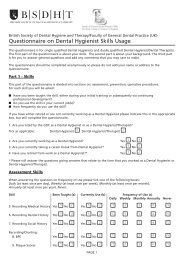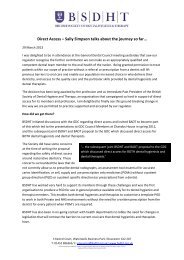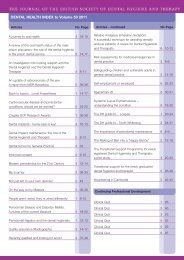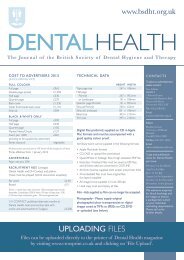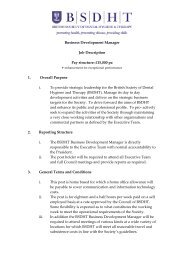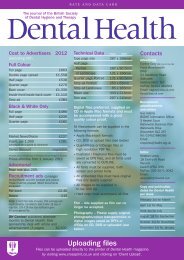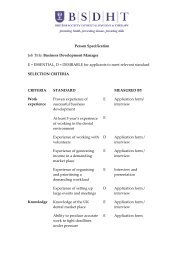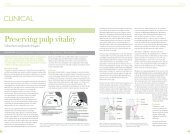Dental Health - British Society of Dental Hygiene & Therapy
Dental Health - British Society of Dental Hygiene & Therapy
Dental Health - British Society of Dental Hygiene & Therapy
- No tags were found...
You also want an ePaper? Increase the reach of your titles
YUMPU automatically turns print PDFs into web optimized ePapers that Google loves.
eviewsReviewsIn this issue <strong>of</strong> <strong>Dental</strong> <strong>Health</strong> AlisonLowe provides a short summary <strong>of</strong> someinteresting items from other sources.This is your brain onsugar – study showshow high fructose dietsabotages learning andmemory.The Peer Reviewed Journal<strong>of</strong> Physiology.15th May 2012The results <strong>of</strong> a recent UCLA studyhave shown that a diet high in fructosealters the brain’s ability to learn andretain information. However, theaddition <strong>of</strong> Omega-3 fatty acids to thediet can counteract this disruption.Whilst earlier research has revealedhow fructose harms the body throughits role in diabetes and obesity, thisstudy is the first to uncover howsweeteners influence the brain.Sources <strong>of</strong> fructose in the western dietinclude cane sugar (sucrose) and highfructose corn syrup, an inexpensiveliquid sweetener (the researcherswere less concerned about naturallyoccurring fructose in fruits as they alsocontain important antioxidants). Theaverage American consumes 35lbs <strong>of</strong>high fructose corn syrup per year.Researchers studied two groups <strong>of</strong>rats that each consumed a fructosesolution as drinking water for sixweeks. The second group also receivedomega-3 fatty acids in the form <strong>of</strong>flaxseed oil and docoahexaenoicacid (DHA), which protects againstdamage to the synapses (the chemicalconnection between brain cells thatenable memory and learning). DHA isessential for synaptic function i.e. braincells’ ability to transmit signals to oneanother and since our bodies can notproduce DHA it must be supplementedthrough our diet.The animals were fed standard ratchow and trained in a maze twice dailybefore starting the experimental diet.The UCLA team tested how well therats were able to navigate the maze,which contained numerous holes butonly one exit (visual landmarks wereplaced in the maze to help the ratslearn and remember the way).Six weeks later, the researcherstested the rats’ ability to recall theroute and escape the maze. The secondgroup <strong>of</strong> rats navigated the maze muchfaster than the rats that did not receivethe omega 3 fatty acids.The DHA deprived rats were slower,their brains showed a delay in synapticactivity; disrupting their ability tothink clearly and recall the route theyhad learnt 6 weeks earlier. They hadalso developed a resistance to insulin(the hormone that controls bloodglucose and regulates synaptic functionin the brain). A closer look at therats’ brain tissue suggested that theinsulin had lost much <strong>of</strong> its power toinfluence the brain cells. Insulin hasan important role to play but because itcan penetrate the blood-brain barrier itmay signal neurons to trigger reactionsthat disrupt learning and causememory loss.It is thought that eating too muchfructose could block insulin’s ability toregulate how cells use and store sugarfor the energy required for processingthoughts and emotions. These findingsillustrate that what you eat affects howyou think – food for thought indeed.The association <strong>of</strong> dentalplaque with cancermortality in Sweden.A longitudinal study.BMJ Open 2012:2published 11th June 2012<strong>Dental</strong> plaque bi<strong>of</strong>ilm may beassociated with premature deathdue to cancer according to a study<strong>of</strong> 1390 randomly selected youngSwedes followed up from 1985 to 2009.Research suggests that there may be alink between plaque levels and cancerand death due to cancer. Althoughthe cause and development <strong>of</strong> thedisease was not taken into account, thepresence <strong>of</strong> high bacterial load on toothsurfaces and gingival margins wasassociated with poor outcome.Of the 1390 participants, 4.2%(58) had died prematurely during thefollow up, 35 as a result <strong>of</strong> cancer.Causes <strong>of</strong> death were recorded fromnational statistics and classifiedaccording to the WHO classification <strong>of</strong>disease. The amount <strong>of</strong> dental plaquebetween those who had died versussurvived was statistically significantmaking it a strong independentpredictor. All subjects underwent oralclinical examination and answered aquestionnaire assessing backgroundvariables such as socioeconomic status,frequency <strong>of</strong> dental visits and smoking.Age increased the risk <strong>of</strong> death as didmale gender. The malignancies weremost widely scattered in men whilstbreast cancer was the most frequentcause <strong>of</strong> death in women.The study hypothesis was confirmedby showing that poor oral hygiene,as reflected in the amount <strong>of</strong> dentalplaque, was associated with increasedcancer mortality. Oral health incancer patients has been cited as aconcern during and following therapy.Although, the conclusions <strong>of</strong> the studydo not demonstrate cause and effect,they raise concerns about potentialsystemic consequences <strong>of</strong> poor oralhealth and more specifically death dueto cancer.34 <strong>Dental</strong> <strong>Health</strong> Volume 51 No 6 <strong>of</strong> 6 November 2012



